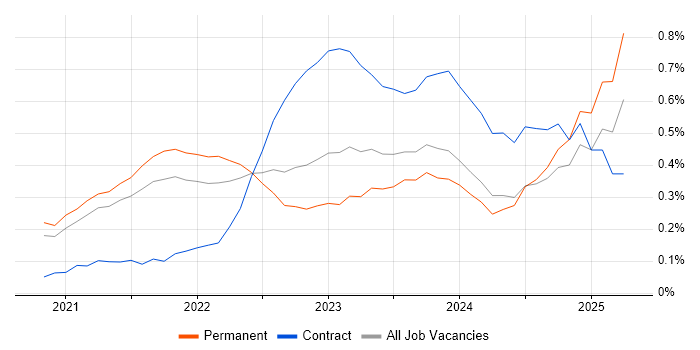Next.js
South West > Bristol
The table below provides summary statistics for permanent job vacancies advertised in Bristol requiring Next.js skills. It includes a benchmarking guide to the annual salaries offered in vacancies that cited Next.js over the 6 months leading up to 3 May 2025, comparing them to the same period in the previous two years.
| 6 months to 3 May 2025 |
Same period 2024 | Same period 2023 | |
|---|---|---|---|
| Rank | 92 | 152 | 169 |
| Rank change year-on-year | +60 | +17 | +2 |
| Permanent jobs citing Next.js | 8 | 12 | 8 |
| As % of all permanent jobs advertised in Bristol | 0.64% | 0.39% | 0.30% |
| As % of the Libraries, Frameworks & Software Standards category | 2.80% | 1.53% | 1.07% |
| Number of salaries quoted | 8 | 12 | 8 |
| 10th Percentile | £58,000 | £45,375 | £39,750 |
| 25th Percentile | £67,019 | £51,563 | £42,188 |
| Median annual salary (50th Percentile) | £68,525 | £61,500 | £63,625 |
| Median % change year-on-year | +11.42% | -3.34% | +1.80% |
| 75th Percentile | £76,394 | £64,750 | £76,563 |
| 90th Percentile | £100,000 | - | £77,500 |
| South West median annual salary | £66,763 | £61,500 | £62,500 |
| % change year-on-year | +8.56% | -1.60% | - |
All Software Libraries and Frameworks
Bristol
Next.js falls under the Software Libraries and Frameworks category. For comparison with the information above, the following table provides summary statistics for all permanent job vacancies requiring technical specification, industry standards, software libraries and framework skills in Bristol.
| Permanent vacancies with a requirement for technical specification, industry standards, software libraries and framework skills | 286 | 784 | 747 |
| As % of all permanent jobs advertised in Bristol | 22.77% | 25.27% | 28.32% |
| Number of salaries quoted | 223 | 606 | 457 |
| 10th Percentile | £42,500 | £40,000 | £37,800 |
| 25th Percentile | £52,500 | £43,750 | £47,500 |
| Median annual salary (50th Percentile) | £62,500 | £60,000 | £60,000 |
| Median % change year-on-year | +4.17% | - | +9.09% |
| 75th Percentile | £77,500 | £75,000 | £77,500 |
| 90th Percentile | £93,778 | £87,500 | £87,500 |
| South West median annual salary | £60,000 | £55,000 | £55,000 |
| % change year-on-year | +9.09% | - | +4.76% |
Next.js
Job Vacancy Trend in Bristol
Job postings citing Next.js as a proportion of all IT jobs advertised in Bristol.

Next.js
Salary Trend in Bristol
3-month moving average salary quoted in jobs citing Next.js in Bristol.
Next.js
Salary Histogram in Bristol
Salary distribution for jobs citing Next.js in Bristol over the 6 months to 3 May 2025.
Next.js
Co-occurring Skills and Capabilities in Bristol by Category
The follow tables expand on the table above by listing co-occurrences grouped by category. The same employment type, locality and period is covered with up to 20 co-occurrences shown in each of the following categories:
